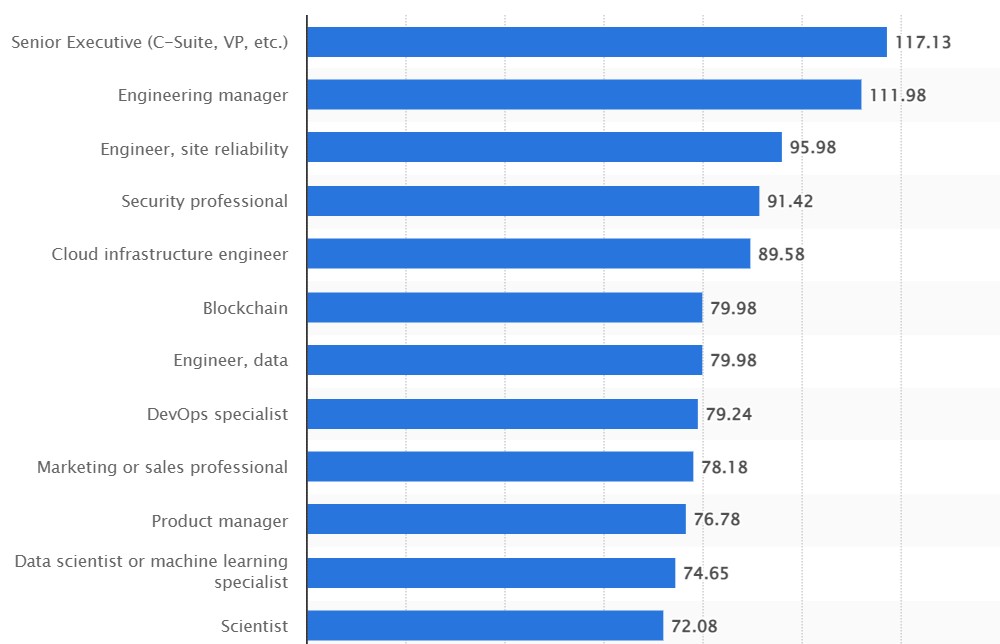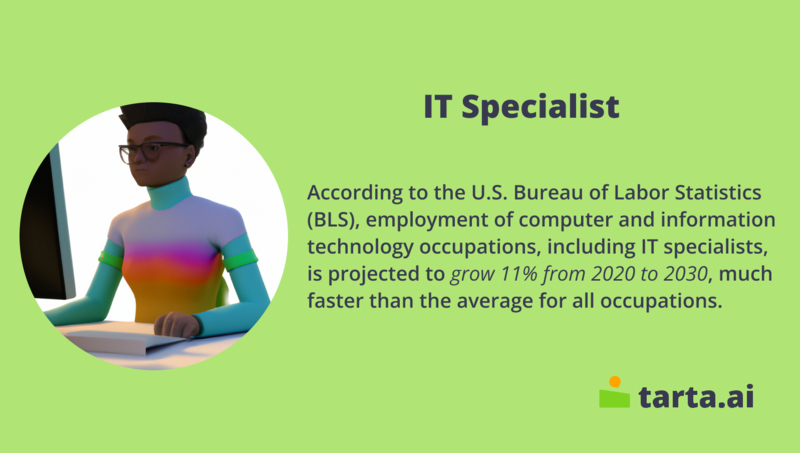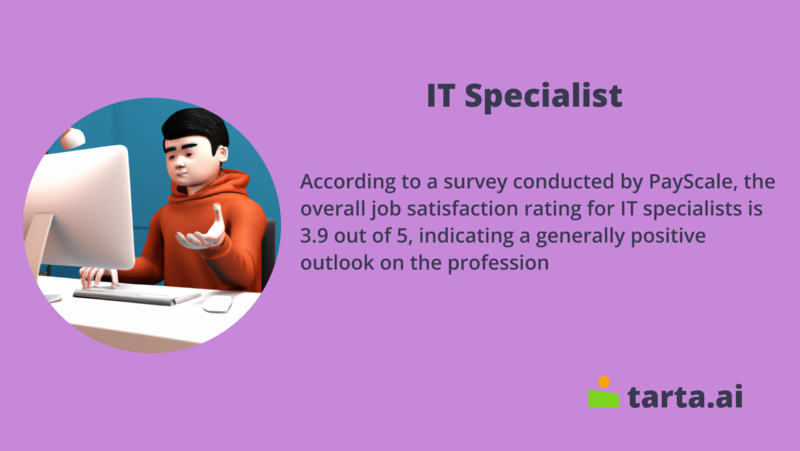IT Specialists: A Guide Into The Essence Of The Field & Professions

An IT (Information Technology) Specialist is a professional who specializes in the design, implementation, and maintenance of information technology systems. They are responsible for ensuring that computer hardware, software, and networks function smoothly, efficiently, and securely. IT Specialists may work in a variety of settings, including corporate offices, government agencies, healthcare facilities, educational institutions, and non-profit organizations. They may specialize in areas such as network administration, cybersecurity, database management, or software development. The role of an IT Specialist can vary widely depending on the industry, organization, or company they work for.
Requirements
To become an IT (Information Technology) Specialist, individuals typically need to meet certain educational and professional requirements. Here are some general requirements for becoming an IT Specialist:
- Education: Most IT Specialist positions require a bachelor's degree in computer science, information technology, or a related field. Some employers may accept candidates with an associate's degree or relevant certifications.
- Technical skills: IT Specialists must have a strong technical background and knowledge of computer systems, hardware, software, and networks. They should also be familiar with programming languages, databases, and cybersecurity.
- Communication skills: IT Specialists must be able to communicate technical information to non-technical users, such as managers or customers. They should also be able to collaborate effectively with other IT professionals and departments.
- Certifications: Some IT Specialist positions may require specific certifications, such as Cisco Certified Network Associate (CCNA), or Microsoft Certified Systems Engineer (MCSE).
- Experience: Many IT Specialist positions require some prior experience working with computer systems or networks. Candidates can gain experience through internships, entry-level positions, or personal projects.
Overall, becoming an IT Specialist requires a combination of education, technical skills, certifications, and experience. It is important for aspiring IT Specialists to stay up-to-date with the latest technologies and industry trends to remain competitive in the job market.

PHOTO: GETTY IMAGES
Responsibilities
The responsibilities of an IT (Information Technology) Specialist can vary depending on the industry, organization, or company they work for. However, here are some of the main and additional responsibilities that an IT Specialist may have:
Main Responsibilities:
- Installing, configuring, and maintaining computer hardware and software.
- Troubleshooting technical issues and providing solutions.
- Managing and maintaining local and wide area networks (LAN/WAN).
- Implementing and monitoring security measures to protect computer systems and data.
- Providing technical support to end-users.
- Collaborating with other IT professionals and departments to ensure seamless operations.
Additional Responsibilities:
- Evaluating and recommending new hardware and software solutions to improve system performance.
- Conducting system audits and identifying areas for improvement.
- Developing and implementing disaster recovery plans.
- Performing regular backups of important data.
- Analyzing system logs and identifying potential issues.
- Ensuring compliance with industry standards and regulations.
- Providing training to end-users on how to use computer systems and software.
Overall, an IT Specialist plays a crucial role in ensuring that computer systems, hardware, software, and networks function smoothly, efficiently, and securely. They must have a strong technical background and be able to communicate effectively with non-technical users.
Skills
The field of information technology (IT) is constantly evolving and requires a diverse set of skills to succeed. An IT Specialist is responsible for various technical tasks, from troubleshooting hardware and software issues to ensuring the security of networks and databases. In addition to their technical expertise, they must also possess a range of interpersonal skills, including communication, problem-solving, and collaboration, to effectively work with others and navigate changing technologies. Here are some of the key skills needed for an IT Specialist:
Hard Skills:
- Proficiency in programming languages such as Python, Java, and C++
- Database management skills including SQL and Oracle
- Networking skills such as TCP/IP, DNS, and routing protocols
- Cybersecurity knowledge and information security skills
- Familiarity with operating systems such as Windows and Linux
- Experience with cloud computing technologies such as AWS and Azure
- Hardware and software troubleshooting skills
Soft Skills:
- Strong communication skills to effectively explain technical concepts to non-technical users
- Problem-solving skills to quickly identify and resolve technical issues
- Analytical skills to identify trends, perform root cause analysis, and develop solutions
- Adaptability and flexibility to quickly adapt to changing technologies and requirements
- Attention to detail to ensure accuracy and completeness of work
- Time management and organization skills to effectively manage multiple tasks and priorities
- Teamwork and collaboration skills to work effectively with other IT professionals and departments.
Fact
Stanford Research Center and Harvard University, and Carnegie foundation found that a whopping 85% of job success comes from excellent soft and people skills. 15% comes from technical skills

PHOTO: GETTY IMAGES
Salary
According to data from the US Bureau of Labor Statistics (BLS), the median annual wage for computer and information technology occupations, including IT Specialists, was $93,250 as of May 2020. However, it's important to note that this is a median value, and salaries can vary widely based on the different factors, as well as other factors such as company size and job responsibilities.
Here is a breakdown of the average annual salary for IT Specialists in some of the highest-paying states, based on data from BLS:
State | Average Annual Salary |
California | $121,040 |
New York | $103,840 |
Virginia | $100,280 |
Texas | $96,540 |
Illinois | $96,430 |
District of Columbia | $96,040 |
Washington | $95,660 |
New Jersey | $94,320 |
Maryland | $93,580 |
Massachusetts | $92,840 |
It's important to note that salaries can also vary depending on the specific industry or company an IT Specialist works for. For example, IT Specialists in the finance and insurance industry tend to earn higher salaries than those in the education industry.
Additionally, salaries for IT Specialists may also include bonuses, profit sharing, and other forms of compensation.

Average salaries of software developers worldwide as of early 2022, by role (in 1,000 U.S. dollars) by statista.com
Factors that influence the earnings
- Years of experience: Generally, IT Specialists with more years of experience in the field tend to earn higher salaries.
- Education and certifications: IT Specialists with advanced degrees or certifications in specialized areas such as network security, cloud computing, or data analytics may earn higher salaries than those with only a bachelor's degree or less.
- Industry: IT Specialists working in industries such as finance, healthcare, and technology tend to earn higher salaries than those in other industries.
- Geographic location: The location where an IT Specialist works can have a significant impact on salary. Generally, IT Specialists in larger cities or areas with a high demand for tech talent can command higher salaries.
- Job responsibilities: The specific duties and responsibilities of an IT Specialist can also impact their salary. For example, IT Specialists who are responsible for managing large-scale projects or overseeing teams may earn higher salaries than those with more limited responsibilities.
- Company size: The size of the company where an IT Specialist works can also influence their salary. Generally, larger companies may offer higher salaries than smaller companies, although this can vary depending on the industry and location.
It's important to note that while these factors can all play a role in determining an IT Specialist's salary, individual employers may also have their own policies and compensation structures that can influence earnings.
Did you know?
Software engineer having specialization in machine learning, data science are in-demand in developing technology markets with less supply. That means Software engineers with machine learning, salesforce and data science are less in the IT sector where demand is most companies.
Ways to improve earnings
IT Specialists have a valuable and in-demand skill set that can provide you with a rewarding career. However, you may be wondering how you can increase your earning potential and take your career to the next level. So, we'll explore some strategies for improving your earnings as an IT Specialist, including acquiring additional certifications, developing specialized skills, and seeking promotions or leadership roles. Whether you're just starting out in your career or looking to advance to the next level, these tips can help you maximize your earning potential and achieve your professional goals. So, here are some options:
- Acquiring additional certifications: IT Specialists who obtain specialized certifications may be able to command higher salaries.
- Pursuing higher education: An IT Specialist who obtains an advanced degree, such as a master's degree in information technology or a related field, may be able to increase their earning potential.
- Developing specialized skills: IT Specialists who develop specialized skills in areas such as programming languages, database management, or network architecture may be able to earn higher salaries.
- Seeking promotions or taking on leadership roles: An IT Specialist who takes on more responsibility, such as managing teams or overseeing large-scale projects, may be able to command a higher salary.
- Working in high-demand industries: IT Specialists who work in industries such as finance, healthcare, or technology may be able to command higher salaries due to the high demand for skilled tech talent in these fields.
- Negotiating salary: When starting a new job or during performance reviews, IT Specialists can negotiate their salary to ensure they are being compensated fairly based on their skills and experience.
It's important to note that while these strategies can help IT Specialists improve their earnings, individual factors such as geographic location, job responsibilities, and company policies can also have a significant impact on salary.
Additional benefits
IT Specialists play a crucial role in helping businesses and organizations leverage technology to achieve their goals. In addition to a competitive salary, many employers also offer a range of benefits that can help make your job more rewarding and provide you with added financial security. By taking advantage of these benefits, you can improve your overall well-being, advance your career, and achieve greater success in your role as an IT Specialist. So, here is the list of some pluses:
- Health insurance: Many employers offer health insurance as part of their benefits package. This can include coverage for medical, dental, and vision care.
- Retirement savings plans: Some employers offer retirement savings plans such as 401(k) plans or pension plans to help employees save for their future.
- Paid time off: Most employers offer paid time off for vacation, sick leave, and holidays.
- Flexible work arrangements: Many IT Specialists have the option to work from home or have flexible schedules, allowing them to better balance their work and personal lives.
- Training and development programs: Employers may offer training and development programs to help IT Specialists stay up-to-date on the latest technologies and improve their skills.
- Employee assistance programs: Some employers offer employee assistance programs, which can include counseling services, financial advice, and legal assistance.
These benefits can vary depending on the employer and the industry, but they can provide IT Specialists with additional financial security, work-life balance, and opportunities for personal and professional growth.
Job environment
An IT Specialist's job environment can vary depending on their specific role and the organization they work for. However, in general, IT Specialists work in an office or computer lab environment where they can access the necessary technology and equipment to perform their job duties. They may work independently or as part of a team, and may be required to interact with other departments or clients.
Here is a table outlining some common settings and tools that an IT Specialist may work with:
Setting | Tool |
Office | Computer hardware |
Computer lab | Operating systems |
Data center | Software applications |
Remote/Telework | Network hardware |
Onsite client | Mobile devices and tablets |
Help desk | Diagnostic tools |
As an IT Specialist, you may be required to work flexible hours to accommodate system maintenance or respond to unexpected technical issues. You may also need to be on call during evenings or weekends in case of emergencies.
Overall, the job environment for IT Specialists can be dynamic and fast-paced, requiring them to stay up-to-date on the latest technologies and trends in order to provide effective support and solutions for their organization.
Did you know?
Technology is responsible for driving more of the US economy than any other profession aside from healthcare.
Work schedule
In general, IT Specialists typically work full-time, 40 hours per week, although some may work more or less depending on their workload and specific role.
IT Specialists may be required to work outside of normal business hours in order to perform system maintenance or upgrades, respond to technical issues or emergencies, or provide support to clients in different time zones. This can include working early morning or late evening shifts, as well as weekends or holidays.
It's important for IT Specialists to maintain a healthy work-life balance in order to prevent burnout and maintain their overall well-being. This can include taking breaks throughout the day, setting boundaries between work and personal time, and engaging in activities outside of work that promote relaxation and stress relief.
Interesting fact
If you work 40 hours a week from age 20-65 you will work just over 90,000 hours in your lifetime.
Education
In order to become an IT Specialist, there are certain education requirements that must be met. These requirements can vary depending on the specific role and employer, but in general, IT Specialists must have a strong foundation in computer science and information technology. This can be achieved through formal education programs such as associate, bachelor's, or master's degree programs. In addition to formal education, certifications in specific technologies and areas of expertise can also be beneficial for IT Specialists. Here is the table outlining the main points of an IT Specialist’s education:
Education Level | Details |
High School | High school diploma or equivalent is typically required, as well as coursework in math and computer science. |
Associate Degree | An associate degree in a computer-related field can be beneficial and may be required by some employers. |
Bachelor's Degree | A bachelor's degree in computer science, information technology, or a related field is often required by employers. |
Master's Degree | A master's degree in computer science or information technology may be beneficial for advanced or specialized roles. |
It's important to note that in addition to formal education, many IT Specialists also have certifications in specific technologies or areas of expertise. These certifications can demonstrate proficiency and knowledge to employers and clients, and can provide a competitive edge in the job market.
Fact
Software development and computer programming job postings show that just over 88 percent of employers are seeking candidates with a Bachelor’s degree.
The time frame of the education process
In general, it can take anywhere from a few months to several years to acquire the necessary skills and qualifications to become an IT Specialist.
For example, some individuals may choose to pursue a vocational or technical training program in a specific area of IT, such as computer networking or programming. These programs can range from a few months to a year or more in length, depending on the program and the individual's prior experience.
On the other hand, individuals who choose to pursue a bachelor's or master's degree in computer science or a related field can expect to spend several years in school. A bachelor's degree typically takes four years to complete, while a master's degree can take an additional two to three years, depending on the program and the individual's pace of study.
In addition, individuals who have already gained experience in the IT industry through internships, entry-level positions, or other means may be able to become IT Specialists more quickly than those who are starting from scratch.
Licenses and Certifications
Obtaining relevant licenses and certifications can be an important aspect of becoming a successful IT Specialist. Certifications demonstrate expertise and proficiency in specific technologies, and can be valuable for advancing one's career, improving job prospects, and increasing earning potential.
Here are some commonly recognized licenses and certifications for IT Specialists:
- CompTIA A+: This certification is widely recognized and covers the fundamentals of computer hardware, software, and networking. It is a good entry-level certification for those looking to begin a career in IT.
- Cisco Certified Network Associate (CCNA): This certification is focused on networking, and covers Cisco products and technologies. It is a widely recognized certification for network engineers and administrators.
- Microsoft Certified Solutions Expert (MCSE): This certification covers a range of Microsoft technologies and is geared towards IT professionals who are responsible for managing and maintaining Microsoft-based systems.
- Certified Information Systems Security Professional (CISSP): This certification is focused on information security and is geared towards professionals who are responsible for securing IT systems and networks.
- Project Management Professional (PMP): This certification is focused on project management and is geared towards professionals who manage IT projects.
Other certifications that may be beneficial for IT Specialists include those related to cloud computing, virtualization, data analytics, and programming languages.
NOTE
Certifications are not a substitute for education and experience but can supplement and enhance them. Many certifications require passing an exam or completing a training program, and may require ongoing education and renewal to maintain certification status.
Ways of career development
Career development is an important aspect of any profession, including IT Specialists. Here are some ways IT Specialists can advance their careers:
- Specialize in a specific area of IT: IT is a broad field, and there are many areas of specialization, including cybersecurity, network engineering, software development, and data analysis. By focusing on a specific area and becoming an expert in it, IT Specialists can differentiate themselves and become more valuable to employers.
- Pursue higher education: Earning a higher degree, such as a master's degree in computer science or a related field, can help IT Specialists advance their careers and qualify for higher-level positions.
- Obtain relevant certifications: As mentioned earlier, certifications can demonstrate proficiency in specific technologies and can be valuable for career advancement.
- Gain experience: Experience is a critical component of career development for IT Specialists. Entry-level positions and internships can provide valuable hands-on experience, while mid-level and senior-level positions can provide opportunities for leadership and management experience.
- Stay current with technology trends: IT is a constantly evolving field, and it's important for IT Specialists to stay up-to-date with the latest technologies and trends. Attending conferences, taking training courses, and reading industry publications can help IT Specialists stay current and informed.
- Develop soft skills: Soft skills, such as communication, teamwork, and leadership, are important for career advancement in any profession. IT Specialists should focus on developing these skills in addition to technical skills to become well-rounded professionals.
By focusing on these career development strategies, IT Specialists can advance their careers, increase earning potential, and achieve their professional goals.
So, as you see, the field of information technology (IT) is vast and offers many different career paths, from cybersecurity to software development to project management. Within these fields, there are also numerous specializations and subfields that IT professionals can pursue to further their careers. We will explore some of these specializations and subfields, providing a brief description of each to help you better understand the many career paths available within the IT industry.
Subfield/Specialization | Description |
Cybersecurity | Focuses on protecting computer systems, networks, and sensitive data from cyber threats |
Network Engineering | Involves designing, building, and maintaining computer networks |
Software Development | Focuses on creating and maintaining software applications |
Data Analysis | Involves analyzing and interpreting data to make business decisions |
Cloud Computing | Involves using remote servers to store, manage, and process data |
Artificial Intelligence | Involves developing computer systems that can perform tasks that typically require human intelligence, such as language translation, decision-making, and pattern recognition |
Web Development | Involves designing and creating websites |
Database Administration | Involves designing, maintaining, and securing databases |
Project Management | Involves overseeing IT projects and ensuring they are completed on time and within budget |
Technical Writing | Involves creating documentation for technical products or services |
Alternative Careers and Similar Jobs
As an IT specialist, you have a broad range of skills and knowledge that can be applied to many different roles and industries. If you're looking for a change of pace or simply want to explore other career options, there are many alternative careers and similar jobs that may interest you. Here are a few examples:
- Computer and Information Research Scientist: In this role, you would conduct research and develop new technologies to solve complex problems in various fields, such as business, science, and medicine.
- Information Security Analyst: If you're interested in cybersecurity, this role involves designing and implementing security measures to protect computer systems and networks from cyber attacks.
- Database Administrator: In this role, you would design, install, and maintain databases that are used to store and manage important information.
- Computer Network Architect: If you enjoy working with computer networks, this role involves designing and building data communication networks, such as local area networks (LANs), wide area networks (WANs), and intranets.
- Technical Writer: If you enjoy writing and have a knack for explaining technical concepts in an easy-to-understand way, this role involves creating user manuals, instructional videos, and other technical documentation.
These are just a few examples of alternative careers and similar jobs that an IT specialist may be interested in pursuing. With your strong background in IT, you have many options available to you if you're looking for a change of pace or simply want to explore different career paths.
Job Market
The job market for IT specialists in the United States is generally very strong, with high demand for skilled professionals in a wide range of industries.

This growth is driven by the increasing reliance on technology in many industries, from healthcare to finance to retail. Additionally, the BLS notes that there is a growing need for IT specialists who can help organizations adapt to new technologies and ensure that their computer systems and networks are secure.
In terms of specific industries, IT specialists are in particularly high demand in the technology, healthcare, finance, and government sectors. However, almost every industry requires IT specialists to some degree, so there are opportunities available in many different fields.
Overall, the job market for IT specialists in the US is very strong, with high demand for skilled professionals across a wide range of industries.
Possibilities of part-time job
There are many possibilities for part-time work as an IT specialist. Many organizations, particularly smaller businesses or startups, may not require a full-time IT specialist, but still, need someone to manage their computer systems and networks on a part-time basis. Additionally, some IT specialists may choose to work part-time or freelance as consultants, providing their expertise and services to multiple clients.
Another option for part-time work as an IT specialist is to work as a remote or freelance technician. With the increasing popularity of remote work and the growth of the gig economy, there are many opportunities available for IT specialists to work on a project-by-project basis, providing their services to clients remotely.
Overall, while full-time positions may be more common in the IT field, there are still many possibilities for part-time work as an IT specialist, particularly for those who are willing to work as freelancers or consultants.
Possibilities of remote job
Remote work is becoming increasingly common in the IT field, and there are many possibilities for IT specialists to work remotely. With the growth of cloud computing and remote access technologies, it is now possible for IT specialists to manage computer systems and networks from anywhere in the world.
Some organizations, particularly those that are distributed across multiple locations, may have a remote IT team that works from different locations. Additionally, many IT consulting firms may allow their employees to work remotely, as long as they have the necessary tools and technologies to connect with clients and manage projects.
Overall, the possibilities for remote work as an IT specialist are plentiful, particularly for those who have the necessary skills and tools to work remotely. With the growth of remote work, IT specialists can now work from anywhere in the world and provide their services to clients across different industries and geographies.
Job satisfaction
The job satisfaction of IT specialists can vary depending on a variety of factors such as job duties, company culture, salary, and work-life balance.

Additionally, the same survey found that factors such as career opportunities, the ability to work with cutting-edge technology, and the opportunity to solve complex problems were among the top contributors to job satisfaction among IT specialists. However, like any profession, individual experiences and opinions may vary.
Here is a table outlining some potential advantages and disadvantages of working as an IT specialist:
Advantages | Disadvantages |
High demand for skilled IT professionals | Long hours and high stress levels |
Competitive salaries and benefits | Constant need for learning and staying updated |
Opportunities for career advancement | High-pressure situations and critical deadlines |
Opportunities for remote and freelance work | Limited interpersonal interactions with coworkers |
Wide range of industries and job opportunities | Can involve sedentary and solitary work |
Ability to work with cutting-edge technologies | Potential for burnout from intense workloads |

PHOTO: GETTY IMAGE
Government Programs
- National Science Foundation (NSF) Research Experiences for Undergraduates (REU) - This program provides undergraduate students with opportunities to conduct research in a variety of STEM fields, including computer science and information technology.
- U.S. Department of Labor Apprenticeship Programs - These programs provide on-the-job training and education for workers in a variety of industries, including IT. Apprenticeships can be a way for individuals to gain hands-on experience and earn a salary while learning new skills.
- Federal Information Technology Acquisition Reform Act (FITARA) - This law requires federal agencies to improve their IT acquisition processes and ensure that their IT staff have the necessary skills and training to effectively manage and implement technology projects.
- Department of Defense (DoD) Cyber Scholarship Program - This program provides funding for students pursuing degrees in cybersecurity fields in exchange for service with the DoD after graduation.
These are just a few examples of government programs available for IT specialists. There may be additional programs available at the state and local levels as well
- IT specialists are in demand in a wide range of industries, including healthcare, finance, manufacturing, and government.
- There are many subfields and specializations within the field of IT, which provides IT specialists with opportunities for career development and advancement.
- Education and certifications are important for IT specialists to stay competitive in the job market and advance in their careers.
- IT specialists may have the opportunity to work remotely or on a part-time basis, depending on the employer and job requirements.
- The salary for IT specialists varies depending on experience, education, location, and industry, but tends to be higher than average for other occupations.
FAQ
What is the job outlook for IT specialists?
Positive with above-average growth projected.
In which industries are IT specialists in demand?
Healthcare, finance, manufacturing, and government among others.
What are the opportunities for career development for IT specialists?
Plenty of subfields and specializations for career development and advancement.
How important are education and certifications for IT specialists?
They are important to stay competitive and advance in careers.
Can IT specialists work remotely?
Yes, depending on the employer and job requirements.
What are the key skills required for IT specialists?
Technical skills, problem-solving skills, communication skills, and adaptability.
What is the average salary for IT specialists?
The average salary for IT specialists in the US is around $85,000 per year.
What are the benefits of being an IT specialist?
Opportunities for career advancement, high earning potential, and job security.
How does the job outlook for IT specialists compare to other professions?
The job outlook for IT specialists is generally positive and growing faster than the average for all occupations.
What are some emerging technologies that IT specialists should be familiar with?
Cloud computing, cybersecurity, artificial intelligence, and blockchain are all areas that IT specialists should be familiar with for career growth and development.